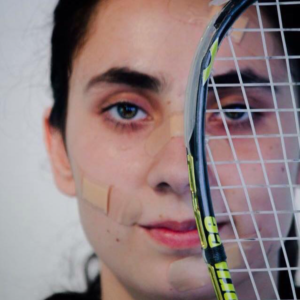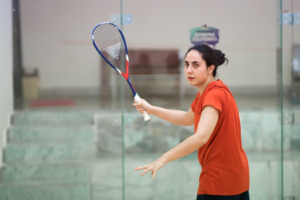 BY CATE BROWN
BY CATE BROWN
“My name is Noorena Shams, and my name is based on a myth.”
Noorena tugs at her cascading ponytail, her fiery onyx eyes alight, “Pashtuns believe that whoever has this name for a daughter, then they will go on to give birth to a son. My name literally means, No more girls.” A coy smile swells across her face. “But my father, he always told me that, for me, Noorena means, No more girls like you.”
And that may be true.
Noorena Shams is an internationally ranked squash player from Dir Valley, Pakistan, a Federally Administered Tribal Area (FATA) along the border of Afghanistan, home to Pakistan’s Pashtun minority, and once a formidable Taliban stronghold. At age 21, she has represented her country in over 127 international competitions and holds the distinction of being the first female athlete from Dir Valley in the past century. As a senior in high school, Noorena splits her time between training at The Jansher Khan Squash Academy in Peshawar, studying for college-entry exams like the ACTs and advocating for the rights of women and girls in sport. I spoke to Noorena while she was in New York, meeting with fellow social justice advocates at Human Rights Watch.
“Not many people take sports seriously in Pakistan,” she said. “When I first started playing, I had to convince people that this was more than a hobby.” For Noorena, sports have become a way of life.
“It all started with cycling. My father gave me my first cycle when I was ten, but I wasn’t allowed outside of the house because of security problems,” said Noorena. “And apart from that, girls don’t go outside in Dir Valley. But I did.”
Soon, Noorena was navigating more than domestic guards and disgruntled commuters. Close to the Afghanistan-Pakistan border, Dir Valley was at the heart of a year-long offensive between Pakistani security forces and the Taliban. Over the course of 2009, The Pulitzer Center estimates that over 2.5 million civilians were displaced from the greater Dir Valley region: Noorena was one of them.
“When the war started, all of our schools were closed,” Noorena continued. “We were home all day, so I started playing cricket with my brothers and the soldiers.” Noorena describes life during the war: her house was bombed; she routinely woke up to cannon fire; her brother counted the bullet shells scattered across their yard every day. Jaw set, she rattled off the details as if jumping rope.
“After a year, I was sent to Peshawar for my studies since my Mom was very disturbed,” Noorena continued. “When I arrived, I found Mr. Islam and he became my cricket coach.” Although Coach Islam believed that Noorena was good enough to secure an athletic scholarship at the academy, only boys were invited to play. “So he gave me his surname, he cut my hair and I became his son.”
For the next year, Noorena became ‘Noor’ and she enjoyed an incredibly successful career as the vice captain of Pakistan’s Under-15 National cricket team. As a spinballer, she could run as fast as all the boys. She could hit as hard as all the boys. Everything was going well, as long as she didn’t take a shower.
At fifteen, the façade began to crack. “There were guys with facial hair and voices changing and “I realized, hey, I’m in trouble… I can’t do that!” Noorena folded into a deep-hearted laugh. Coach Islam agreed that it was time to share her secret with the entire team. And so they stood up at the end of practice and shared her growing secret.
“The team was a bit shocked at first, but they also knew that they could not proceed without me,” she said. “So the guys said, ‘we don’t care about your gender or something. You have to play with us.’”
The academy didn’t feel the same. After Noor’s identity became public, her scholarship was given to a boy and she was forced to find a new school, as well as an all-girls cricket team in Peshawar. Noorena cites this transition as a key turning point in her understanding of culture and sport in Pakistan. While the boys’ team was all about cricket and nothing else, on the girls’ team she was subject to daily homilies about how to think and behave in the rest of her life.
“The attitude and the behavior towards girls was totally different: There was no culture in sports for guys, but there was culture for girls,” she said. “There was no religion in sports for guys, but there was for girls.”
Disenchanted with women’s team dynamics, Noorena turned her attention towards squash. A new sport brought new challenges. As a single female athlete, she was refused daily court-time based on her gender; she was asked to pay male opponents in exchange for their time; and she was afforded strength coaching, but only if she joined a men’s calisthenic program where she was outnumbered 300 to 1.
After months of training, Noorena finally qualified for her first international tournament. She arrived in Malaysia only to find that her male coach had booked a single hotel room for their week-long stay. Noorena crossed countless boundaries in pursuit of sport, but she also recognized that certain boundaries kept her safe: she bought a sleeping bag and slept on the linoleum floor outside.
 “The UN celebrates that sports are about equality and that they elevate girls, but sports can also create risk,” says Minky Worden, Director of Global Initiatives at Human Rights Watch (HRW). Minky has helped promote Noorena’s campaign for women and girls on the global stage. “In Noorena’s case, it was like Russian roulette that she didn’t get sexually assaulted by her coaches or by the other players.”
“The UN celebrates that sports are about equality and that they elevate girls, but sports can also create risk,” says Minky Worden, Director of Global Initiatives at Human Rights Watch (HRW). Minky has helped promote Noorena’s campaign for women and girls on the global stage. “In Noorena’s case, it was like Russian roulette that she didn’t get sexually assaulted by her coaches or by the other players.”
Worden leads an innovative campaign that advocates for human rights through sports. By harnessing their popular appeal, Worden believes that athletes are well-positioned to shift the needle on important social justice issues. “There is a tradition of this— Arthur Ashe, Billie Jean King, Jackie Robinson,” Worden said. “I really see Noorena in that pantheon of athlete-activists who are prepared to elevate other athletes and human rights more generally.”
Noorena still faces gender-based discrimination, but she believes that things are changing. This past December, Noorena was invited to join The National Sports Committee in Pakistan where she’ll be able to weigh-in on the future of her nation’s sports. She has also been invited to speak in front of The UN Human Rights Council, and in 2018, she was the first-ever female athlete-activist to hold the floor.
Out of all her successes, Noorena is proudest of her impact back home.
“I thought the people from Dir would never support me, but once they saw me having success, there are so many— even men— supporting me now,” Noorena said. “They have even pushed me to build a squash court in Dir. This makes me happy. I’m not only changing things for women; I am changing things for boys as well.”